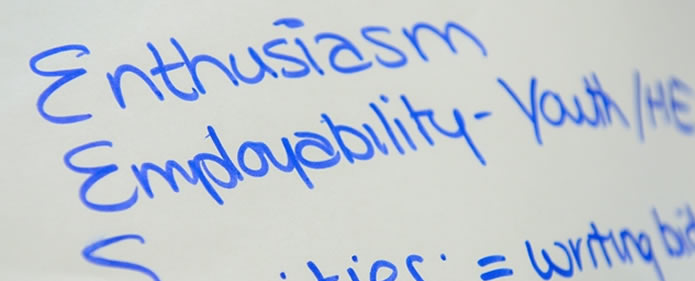
For Staffordshire University, four is the magic number
It was awarded almost €440,000 through Erasmus+ for their partnership project ‘Developing Employability Skills through Innovative Education’ - one of only 12 UK higher education institutions to receive such funding. Their consortium consists of four higher education institutions and four youth organisations in four European countries.
At a time of economic challenge across Europe there is an acknowledged need for more innovation and entrepreneurship among businesses, to foster economic growth and provide more jobs for our unemployed (or under-employed) labour market. While our youth and adult job seekers leave schools and universities with educational qualifications, employers complain that there is a mismatch in the skills these job seekers offer and the skills the employers require. Staffordshire University, with their partners in Tenerife, Crete and Slovenia, seek to address this issue and improve the employment prospects of job-seekers through the use of MOOCs (Massive Open On-line courses). These courses will be directly related to the needs of the local labour market and recognised by local employers and will have a positive impact on employment skills.
The project researches the skills’ needs, develops targeted MOOC tools, implements, tests and refines a method for higher education institutions to promote and support the use of MOOCs to address local labour market skills shortages. Through this they hope to support regional economic development and ultimately improve the employability of local youth and adult learners.
The consortium is researching the availability and access of MOOCs by EU region and by curriculum sector, including factors such as language, cost, level, accreditation and content, including transversal skills. They are also carrying out research into local labour market skills’ needs and the skills offered by work-seekers, using partner organisations with direct access to employers, work seekers and labour market intelligence. They will then be able to match MOOC offerings to the labour market needs as well as produce and implement training for stakeholders, such as Academics, learning support staff, careers staff, recruitment staff, employers and HR professionals, on the value of MOOC learning.
The consortium is also developing models for higher education institutions to host a 'MOOC Cafe/Study Club' (MSC) which they will promote through their partners, networks and contacts within youth organisations, HR departments and Local Chambers of Commerce. They plan to run a pilot of four 'MOOC Cafes' which they hope to then roll out across more sites.
This project is highly ambitious from three important viewpoints – we want to help work seekers gain the skills they need to get local jobs, we want to educate and up-skill staff in the authoring of on-line resources, and then to leave a sustainable model for the inclusion of MOOCs in the curriculum, especially those aligned to the opportunities identified in the local labour market.
- Rosemary Borup, Principal Lecturer, Staffordshire University.
